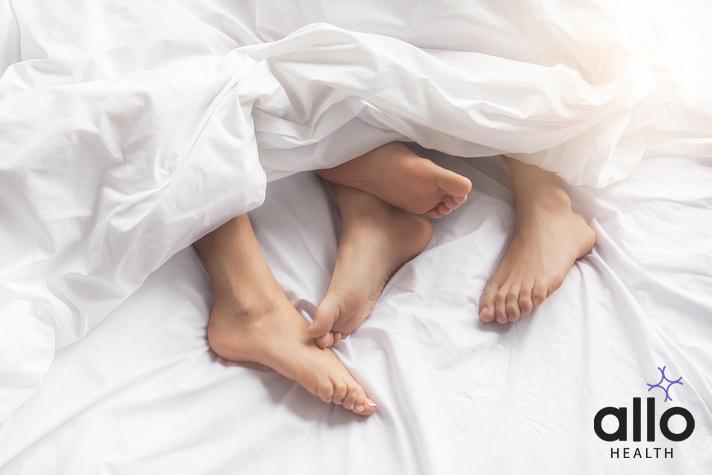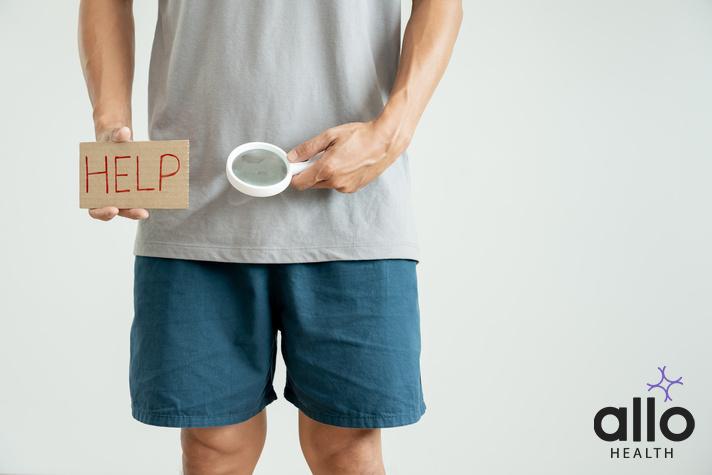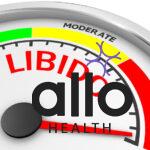How to Increase Male Sex Drive After 40: Tips for a Strong Sex Drive

Allo Health is dedicated to personalized well-being, offering support and trusted information tailored to individual health goals. The platform emphasizes human-generated content, led by a distinguished medical team of experts, including physicians and sexual health specialists. Their commitment to credibility involves rigorous fact-checking, authoritative research, and continuous updates to ensure accurate, up-to-date information. Allo Health's unique approach goes beyond conventional platforms, providing expert-led insights and a continuous commitment to excellence, with user feedback playing a crucial role in shaping the platform's authoritative voice.

Dr. Raj. R holds an undergraduate medical degree from the Philippines, and has a bachelors background in Psychology. His experience working in the field of urology further brought his interest forward in working towards his passion of understanding the science of attraction, intimacy, sex and relationships. A key motto he practices by remains unprejudiced and non-judgemental care.
Why This Was Upated?
Our experts continually monitor the health and wellness space, and we update our articles when new information became available.
Updated on 12 April, 2024
- Article was updated as part of our commitment to diversity, equity, and inclusion.

"The following blog article provides general information and insights on various topics. However, it is important to note that the information presented is not intended as professional advice in any specific field or area. The content of this blog is for general educational and informational purposes only.
Book consultation
The content should not be interpreted as endorsement, recommendation, or guarantee of any product, service, or information mentioned. Readers are solely responsible for the decisions and actions they take based on the information provided in this blog. It is essential to exercise individual judgment, critical thinking, and personal responsibility when applying or implementing any information or suggestions discussed in the blog."
As men age, it’s not uncommon for their sexual desire and performance to change. Many factors can contribute to a dip in libido and sexual function after the age of 40. This article will explore various strategies and lifestyle changes on how to increase male sex drive after 40.
Importance of Libido for Sexual Health
Libido, often referred to as sexual drive or sexual desire, plays a crucial role in sexual health and overall well-being. It serves as the foundational pillar for a satisfying and fulfilling sexual experience, impacting various aspects of one’s life. Here’s why libido is of utmost importance:
- Better Sexual Functioning: Libido is the initial spark that ignites sexual activity. A healthy libido is essential for initiating and maintaining sexual encounters, contributing to sexual satisfaction.
- Improve Mental Health and Mood: A strong sex drive is closely linked to one’s mental well-being. A robust libido can enhance mood, reduce anxiety levels, and promote a positive outlook on sexual performance and relationships.
- Relationship Satisfaction: Libido plays a significant role in maintaining a satisfying sexual relationship with a partner. A shared desire for sex can strengthen emotional bonds and intimacy.
- Enhance Physical Health: Libido can be an indicator of overall physical health. A loss of libido may be a sign of underlying health conditions, such as hormonal imbalances, cardiovascular concerns, or obesity.
- Balance Hormone Levels: Hormones, particularly testosterone, have a direct influence on libido. Maintaining proper hormone levels is crucial for a healthy sex drive, and deviations can lead to a dip in libido.
- Sexual Satisfaction: A strong libido contributes to a greater desire for sex and, consequently, increased sexual satisfaction for both partners.
- Quality of Life: A healthy libido can enhance one’s overall quality of life, promoting a more active and fulfilling sexual appetite.
- Increase Confidence and Self-esteem: A robust sex drive can boost self-confidence and self-esteem, leading to improved sexual performance and a greater desire for sex.
- Prevention of Sexual Dysfunctions: A consistent libido can help prevent sexual dysfunctions like erectile dysfunction or loss of libido, which may arise as a result of hormonal imbalances or psychological factors.
Libido is the cornerstone of sexual health, influencing sexual desire, function, and overall well-being. Its role extends beyond physical pleasure, encompassing emotional and psychological aspects of intimate relationships. Monitoring and nurturing one’s libido can lead to a more satisfying and fulfilling sex life while serving as an indicator of broader physical and mental health concerns.
Factors Affecting Libido
Libido, or sexual desire, can be influenced by a multitude of factors, including physiological, psychological, and lifestyle-related elements. Understanding these factors is essential for maintaining a healthy and robust sex drive, especially as one ages past 40.
- Hormone Levels: Testosterone, a crucial sex hormone, plays a pivotal role in libido. A dip in testosterone levels, which often occurs after 40, can lead to a loss of sex drive and sexual function.
- Physical Health: Health conditions such as heart disease, diabetes, and obesity can negatively impact sexual function and desire. These conditions affect blood flow, hormone production, and overall physical well-being, all of which are vital for a healthy libido.
- Mental Health: Anxiety, stress, and depression are known libido killers. High stress levels can lead to a dip in sexual appetite and mood for sex. Adequate sleep and stress-reduction techniques can help combat these concerns.
- Lifestyle Habits: Unhealthy habits like smoking, excessive alcohol intake, and substance abuse can hinder sexual performance and desire. Moderation or cessation of these habits is advisable to maintain a healthy libido.
- Relationship Quality: Emotional connection and intimacy with a partner play a significant role in sexual desire and satisfaction. Quality time spent with your partner can help maintain a healthy sexual appetite.
- Medications and Medical Conditions: Certain medications, such as those for hypertension or depression, can have side effects that affect sexual function. Additionally, chronic medical conditions may interfere with libido.
- Age: Age-related changes in hormone levels, physical health, and lifestyle can contribute to a dip in libido after 40. It’s important to be proactive in addressing these changes to maintain a strong sex drive.
A variety of factors, including testosterone levels, physical and mental health, lifestyle choices, relationship quality, and age, can significantly impact libido. Recognizing and addressing these factors is essential for maintaining a healthy and fulfilling sex life as you age. Consultation with a healthcare professional may be necessary to address specific concerns and receive personalized guidance on improving your libido.
Complications Due to Low Libido

Low male libido after the age of 40 can lead to various complications and challenges, affecting not only sexual health but also overall well-being. Here are some of the potential complications:
- Relationship Strain: Loss of libido can strain intimate relationships, causing emotional disconnect and frustration, impacting both partners’ sexual satisfaction.
- Erectile Dysfunction: Reduced sexual desire often accompanies erectile dysfunction, making it challenging to achieve and maintain an erection for sexual activity.
- Mental Health Concerns: Low sex drive can contribute to anxiety, depression, and stress, affecting one’s mood and overall mental health negatively.
- Reduced Sexual Satisfaction: A decline in sexual appetite can lead to unsatisfying sexual encounters, potentially causing dissatisfaction and frustration for both partners.
- Impact on Self-Esteem: Struggles with sexual performance and desire can erode self-esteem and self-confidence, affecting one’s self-image.
- Heart Health: Low libido can be associated with heart health concerns, as some conditions that contribute to a decrease in sexual drive are also risk factors for heart disease.
- Weight Gain: Reduced sexual activity and motivation can lead to weight gain, potentially exacerbating health conditions.
- Hormonal Imbalance: Low sex drive may be a symptom of underlying hormonal imbalances, such as testosterone deficiency, which can affect overall health.
- Unhealthy Coping Mechanisms: Some individuals may turn to unhealthy coping mechanisms, such as excessive alcohol intake, to deal with the loss of libido, further exacerbating the problem.
- Loss of Quality Time: Diminished sexual appetite can result in less quality time spent with a partner, affecting the emotional bond and overall relationship satisfaction.
Addressing low male sex drive after 40 promptly is essential to mitigate these complications. Seeking medical advice, improving lifestyle choices, and addressing underlying health conditions can help restore a healthy libido and overall sexual function.
How to Increase Male Sex Drive After 40

Increasing male sex drive after 40 can be achieved through a combination of lifestyle changes and targeted interventions. Here are some key tips to boost your libido and sexual performance:
- Monitor Testosterone Levels: Keep tabs on your testosterone levels as they tend to decline with age. Consult a healthcare professional to discuss potential hormone therapy or testosterone replacement therapy if you have a testosterone deficiency.
- Regular Exercise: Engaging in moderate exercise can improve blood flow, reduce stress, and maintain a healthy weight. It also plays a role in enhancing physical health and energy levels, which are crucial for a healthy libido.
- Healthy Diet: Consume a balanced diet rich in nutrients, particularly zinc and antioxidants. These nutrients support sexual health and can positively influence sexual desire and performance.
- Stress Management: High stress levels can decrease sexual desire and performance. Practice stress-reduction techniques such as meditation or yoga to alleviate anxiety and enhance your mood for sex.
- Adequate Sleep: Quality sleep is essential for hormone regulation. Ensure you get 7-9 hours of uninterrupted sleep per night to maintain a healthy libido.
- Limit Alcohol Intake: Excessive alcohol consumption can impair sexual function and desire. Moderate your alcohol intake to promote a healthier sex drive.
- Seek Medical Help: If you experience sexual dysfunctions like erectile dysfunction or loss of libido, consult a healthcare professional for appropriate treatments or therapies.
- Emotional Connection: Spend quality time with your partner to nurture emotional intimacy and enhance your sexual appetite. Strong emotional bonds can contribute to a satisfying sexual experience.
- Healthy Lifestyle Choices: Quitting smoking, reducing substance abuse, and addressing other unhealthy habits can positively impact sexual functioning and overall health.
- Vascular Health: Monitor your blood pressure and vascular health regularly. Healthy blood vessels and blood flow are essential for maintaining erectile function.
By implementing these tips, you can address the common challenges that come with age and maintain a healthy libido and sexual drive after 40. Remember that consulting a healthcare professional for personalized advice is essential to address specific concerns about your sexual health.
When to Seek Medical Attention?
Seeking medical attention for low male sex drive after 40 is crucial to address potential underlying concerns and improve your sexual health. Here are some key situations when you should consider consulting a healthcare professional:
- Persistent Loss of Libido: If you experience a prolonged dip in libido, despite addressing lifestyle factors like stress levels, adequate sleep, and regular exercise, it’s time to consult a doctor.
- Sexual Dysfunctions: Any persistent sexual dysfunctions such as erectile dysfunction or difficulties with sexual performance should prompt a medical evaluation.
- Testosterone Deficiency: If you suspect low testosterone levels, characterized by symptoms like fatigue, mood changes, or weight gain, a healthcare provider can perform hormone level tests and discuss the potential need for hormone therapy.
- Impact on Mental Health: Low sex drive can negatively affect mental well-being. If your mood for sex and overall mental health deteriorate, consider professional help.
- Existing Health Conditions: If you have underlying health conditions such as heart disease or diabetes, which may impact sexual function, discuss these concerns with your doctor.
- Unhealthy Habits: Seeking medical attention is advisable if you struggle with quitting unhealthy habits like excessive alcohol intake or smoking, which contribute to low libido and increased risk for heart disease.
In all these scenarios, timely medical intervention can help identify and address the root causes of low male sex drive after 40, improving your sexual health and overall well-being.
Conclusion
A dip in libido and sexual drive after 40 is not uncommon, but it doesn’t have to be permanent. By addressing factors such as testosterone levels, physical health, mental health, and lifestyle choices, you can improve your sexual health and maintain a strong sex drive well into your later years. Consult with a healthcare professional for personalized advice and treatment options to address any specific concerns regarding your sexual function.
Most Asked Questions
-
How does aging affect my sex drive after 40?
As men age, it’s natural for their sex drive to change. Hormones like testosterone tend to decrease, which can impact desire and performance. Our article explores ways to address this and keep your sex drive strong.
-
Can I improve my libido with exercise and diet?
Yes, regular, moderate exercise and a balanced diet can help boost your energy, improve blood flow, and enhance overall health. These factors can contribute to a healthier sex drive.
-
What should I do if I’m experiencing sexual dysfunctions?
If you’re facing concerns like erectile dysfunction, it’s essential to seek medical advice promptly. Treatments are available, and a healthcare professional can help you find the right solution.
-
How can I reduce stress and anxiety to improve my mood for sex?
Managing stress is crucial for a better sex drive. Our article recommends techniques like meditation, yoga, and deep breathing exercises to help alleviate anxiety and enhance your mood for sex.






































